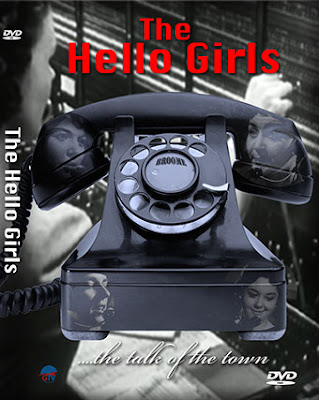The Hello Girls, (dir Mark Cochrane). Screened with A
Taste of Broome, as part of Shinju Matsuri, Goolari Amphitheatre, Broome, Western Australia.
"I don't know why this is called The Hello Girls, we never said
'hello', it was always 'operator' or something like that".
Produced by Goolari Media Enterprises, who run two of the four
Indigenous television stations available in Broome, this 30 minute documentary
screened before the musical performance of A Taste of Broome. The
documentary tells the history of Broome's switchboard operators, women who for
decades connected the town to its residents and to the outside world.
Interviews with those still alive make their deep cameradrie palpable; their
career histories part of the history of the town.
Running on coffee and cigarettes, the telephone operators became
Broome's first line for bomb threats, fires, finding the doctor, gossip and
child-minding ("I'll leave the phone off the hook and you can hear if
the baby starts crying"). They always knew who was having an affair
and always knew when it was over ("the phone calls stopped").
They could make reliable guesses at the true identities of residents trying to
disguise their voices with a handkerchief over the receiver and they would
recognise people's voices in stores, thinking "so that's what they
look like".
They'd do shifts in their bikinis and had no air-conditioning. They
were the first to know that someone had robbed the bank and tried escaping on a
bicycle and the first to know an aircraft had crashed on the opening day of
Shinju Matsuri in 1981. They even took bookings for Sun Pictures screenings.
Anecdotes aside, it's the women's comments on race and class in Broome that
make the most compelling viewing. The hurt of segregation during the 1960s is
still there, as are their scathing judgements of Broome's upper class: "the
pearl masters and owners...always dressed in white... always looking down on the
rest of us".
A Taste of Broome followed the screening of this
entertaining documentary. This two-hour "music-picture" performance
is a highly polished, rigorously rehearsed and well-written narrative presented
by a team of ten accomplished singers and musicians, backed by a superbly
researched set of stills and archival footage.
Martin Scoresese once said he knew the The Band's last show was to
be great event when their first song was played with such
"authority". So it was with A Taste of Broome's opener
"Free Diving" by Lorrae Coffin, followed by songs about the brothels
of Shiba Lane; the Japanese bombing of Broome; Christian missionaries intent on
converting the blackfellas; the stolen generation; pearl divers, and one moving
piece about an Indigenous man who miraculously saved a Dutch mother and her
daughter during the Japanese bombing of Broome. Recognised and honoured by the
Dutch Government for his bravery, his heroism remains ignored by the Australian
Government to this day.
It's a remarkable show, a testament to Broome's amazing musical
talents; the rich, unique and downright funky pearling history; and its deep
multi-culturalism: there, in-place and generations old before it became a
political catch-word for "modern" Australia. If we want our own
New Orleans, it's Broome: unlike any place in Australia, a multicultural fusion
with very high standards in music, a creative gumbo. Yet, there are only
18,000 residents.
 |
| A Taste of Broome performers |
A Taste of Broome seemed like a worthy musical-documentary
successor to Bran Nue Dae and it ran like clockwork after
three Dry Season performances a year for the past five years. Sadly, as
announced at the show's end, this Shinju Matsuri appearance may have been its
last.


No comments:
Post a Comment
Note: only a member of this blog may post a comment.